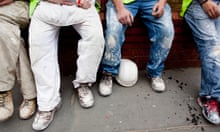I don’t have any grand theory about masculinity. But I know a bit about boys. Partly because I’m at the beach and in the water a lot.
As a surfer you spend a lot of time bobbing about, waiting for something to happen. So eventually, you get talking. Or you listen to others talking. And I spend my work days alone, in a room with people who don’t exist, so these maritime conversations make up the bulk of my social life. And most of the people in the water are younger than me, some by 50 years or more.
I like the teasing and the joking that goes on, the shy asymmetrical conversations, the fitful moments of mutual bewilderment and curiosity. A lot of the time I’m just watching and listening. With affection. Indulgence. Amusement. Often puzzled, sometimes horrified. Interested, but careful, of course, not to appear too interested. And the wonderful thing about getting older – something many women will understand – is that after a certain age you become invisible. And for me, after years of being much too visible for my own comfort, this late life waterborne obscurity is a gift.
There are a lot more girls in the water these days, and hallellujah for that; I can’t tell you how heartening this is. But I want to focus on the boys for a moment. For what a mystery a boy is. Even to a grown man. Perhaps especially to a grown man. And how easy it is to forget what beautiful creatures they are. There’s so much about them and in them that’s lovely. Graceful. Dreamy. Vulnerable. Qualities we either don’t notice, or simply blind ourselves to. You see, there’s great native tenderness in children. In boys, as much as in girls. But so often I see boys having the tenderness shamed out of them.
Boys and young men are so routinely expected to betray their better natures, to smother their consciences, to renounce the best of themselves and submit to something low and mean. As if there’s only one way of being a bloke, one valid interpretation of the part, the role, if you like. There’s a constant pressure to enlist, to pull on the uniform of misogyny and join the Shithead Army that enforces and polices sexism. And it grieves me to say it’s not just men pressing those kids into service.
These boys in the surf. The things they say to me! The stuff I hear them saying to their mates! Some of it makes you want to hug them. Some of it makes you want to cry. Some of it makes you ashamed to be a male. Especially the stuff they feel entitled or obliged to say about girls and women.
What I’ve come to notice is that all these kids are rehearsing and projecting. Trying it on. Rehearsing their masculinity. Projecting their experimental versions of it. And wordlessly looking for cues the whole time. Not just from each other, but from older people around them, especially the men. Which can be heartbreaking to witness, to tell you the truth. Because the feedback they get is so damn unhelpful. If it’s well-meant it’s often feeble and half-hearted. Because good men don’t always stick their necks out and make an effort.
True, the blokes around me in the water are there, like me, for respite, to escape complexity and responsibility for an hour or two, to save themselves from going mad in their working lives, but their dignified silence in response to misogynistic trash talk allows other messages, other poisonous postures to flourish. Too often, in my experience, the ways of men to boys lack all conviction, they lack a sense of responsibility and gravity. And I think they lack the solidity and coherence of tradition. Sadly, modernity has failed to replace traditional codes with anything explicit, or coherent or benign. We’re left with values that are residual, fuzzy, accidental or sniggeringly conspiratorial.
We’ve scraped our culture bare of ritual pathways to adulthood. There are lots of reasons for having clear-felled and burnt our own traditions since the 1960s, and some of them are very good reasons. But I’m not sure what we’ve replaced them with. We’ve left our young people to fend for themselves. We retain a kind of indulgent, patronising, approval of rites of passage in other cultures, including those of our first peoples, but the poverty of mainstream modern Australian rituals is astounding.
What are we left with? The sly first beer your uncle slips you. The 18th birthday party where the keg is the icon. Maybe the B&S ball, if you live in the bush. First drink, first root, first bog-lap in your mum’s Corolla. Call me a snob, but that strikes me as pretty thin stuff. This, surely, is cultural impoverishment. And in such a prosperous country. To my mind, that’s salt rising to the surface, poisoning the future.
In the absence of explicit, widely-shared and enriching rites of passage, young men in particular are forced to make themselves up as they go along. Which usually means they put themselves together from spare parts, and the stuff closest to hand tends to be cheap and defective. And that’s dangerous.
Toxic masculinity is a burden to men. I’m not for a moment suggesting men and women suffer equally from misogyny, because that’s clearly and fundamentally not true. And nobody needs to hear me mansplaining on the subject of the patriarchy. But I think we forget or simply don’t notice the ways in which men, too, are shackled by misogyny. It narrows their lives. Distorts them. And that sort of damage radiates; it travels, just as trauma is embedded and travels and metastasizes in families. Slavery should have taught us that. The Stolen Generations are still teaching us. Misogyny, like racism, is one of the great engines of intergenerational trauma.
A man in manacles doesn’t fully understand the threat he poses to others. Even as he’s raging against his bonds. Especially as he’s raging against his bonds. When you’re bred for mastery, when you’re trained to endure and fight and suppress empathy, how do you find your way in a world that cannot be mastered? How do you live a life in which all of us must eventually surrender and come to terms? Too many men are blunt instruments. Otherwise known, I guess, as tools. Because of poor training, they’re simply not fit for purpose. Because life is not a race, it’s not a game, and it’s not a fight.
Can we wean boys off machismo and misogyny? Will they ever relinquish the race, the game, the fight, and join the dance? I hope so. Because liberation – a process of disarmament, reflection and renewal – isn’t just desirable, it’s desperately necessary. In our homes, in business, and clearly, and most clearly of all, in our politics.

Children are born wild. And that’s beautiful, it’s wondrous, regardless of gender. Even when they’re feral creatures, kids are reservoirs of tenderness and empathy. But some do turn into savages. And sadly most of those are boys. They’re trained into it. Because of neglect or indulgence. And when we meet them in the street, and have them in our classrooms, and haul them into the courts, we recoil from them in horror and disgust. Our detention centres and jails are heaving with them. These wild colonial boys, they’re a terror to Australia. Real and imagined. But I worry about our revulsion for them, our desire to banish them from consciousness for their noncompliance, their mistakes, or their faithful adherence to the scripts that have been written for them.
Boys need help. And, yes, men need fixing – I’m mindful of that. Males arrive in our community on the coattails of an almost endless chain of unexamined privilege. I don’t deny that for a second. But patriarchy is bondage for boys, too. It disfigures them. Even if they’re the last to notice. Even if they profit from it. And their disfigurement diminishes the ultimate prospects of all of us, wherever we are on the gender spectrum. I think we need to admit this.
But before we even get to that point, we have to acknowledge the awkward, implacable fact of their existence, especially those who most offend our sensibilities. We should resist our instinct or our ideological desire to cross the street to avoid them, our impulse to shut them down and shut them out and finally lock them up. We need to have higher expectations of them. Provide better modelling for them.
But before any of that is possible we need to attend to them. Yes, boys need their unexamined privilege curtailed. Just as they need certain proscribed privileges and behaviours made available to them. But the first step is to notice them. To find them worthy of our interest. As subjects, not objects. How else can we hope to take responsibility for them? And it’s men who need to step up and finally take their full share of that responsibility.








